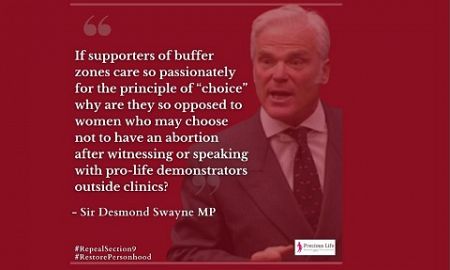MP says 'censorship zones' around abortion centres are "a direct threat to civil liberties"
Statement from Sir Desmond Swayne MP - ‘buffer zones’ around abortion centres would be a direct threat to civil liberties
If ever passed, a law introducing buffer zones would set a dangerous and unjust precedent for restrictions on other opinions that may challenge the perceived status quo at any given time.
After several previous attempts to mandate censorship (buffer) zones around abortion services, last month Bernard Jenkin, Dr Rupa Huq and twenty other MPs again proposed this policy via an amendment to the Police, Crime, Sentencing and Courts Bill. After a thorough grilling, the amendment was not taken to a vote. However, it is unlikely that we have seen the back of this idea for good.
This was a Bill that several of the MPs who co-sponsored are on record as vigorously opposing due to its threats to curb freedom of assembly and speech. It seems that, for these MPs, the right to protest need only apply when it protects their approved set of values.
This is of course the irony central to all such calls for censorship. What reasonable person would not wish to be able to express their own beliefs? Who is qualified to decide what beliefs are ‘wrong’, and what beliefs are, in fact, so ‘wrong’ that they must be forcibly driven from the public forum? The answer is, of course, no one, and certainly not the state.
Yet, if this amendment had passed, we would have surrendered these rights to law enforcement. Those within the “buffer zone” of 150 metres of an abortion facility who made any attempt to “influence or persuade” a person attempting to access its services would have risked up to six months in jail or up to two years on a second offence: a flagrant attack on liberty of expression.
The abortion issue will never be easy, but coercing the silence of either stance will not minimise this conflict
Moreover, if a law along the lines of this recent amendment were ever passed, not only would the right to disagree be erased for groups of demonstrators, but also for family members and friends who may express or even suggest that their loved one may be making the wrong decision, within 150 metres of an abortion facility.
The right to express one’s views is the bedrock of our civil liberties and ought only to be restricted in rare circumstances such as in the case of defamation, slander or incitement to violence. These are behaviours that, as the government’s 2018 review into demonstrations outside abortion clinics pointed out, are already outlawed in the UK and do not characterise the vast majority of pro-life demonstrations. It is, therefore, no wonder that polling shows only 21% of the public support the introduction of censorship zones at every UK abortion clinic.
If supporters of buffer zones truly believe that handing out leaflets, praying the rosary, or even simply offering help to pregnant women in crisis risks women’s safety, why stop at a hundred or so metres? Why just penalise pro-life opinions? Surely if ever passed, such a law would set a dangerous and unjust precedent for restrictions on other opinions that may challenge the perceived status quo at any given time. Moreover, such a law does not distinguish between activities causing harm and those with which someone may disagree.
Outlawing the expression of certain thoughts may create an outward appearance of harmony, at least temporarily, but ultimately it cannot change people’s internal beliefs. Only persuasion, made possible by the free exchange of ideas, can do that. If supporters of buffer zones care so passionately for the principle of “choice”, why are they so opposed to women who may choose not to have an abortion after witnessing or speaking with pro-life demonstrators outside clinics?
Many women each year report being helped by pro-life outreach. Support offered includes counselling, help with rent/housing, providing maternity and baby clothes and other financial support, legal advice, and protection from domestic abuse, among many other things.
The “right” to be protected from feeling “uncomfortable” by encountering different opinions should never be allowed to legally override the right of others to be offered information and support, which many women appreciate, especially if they are not committed to their decision to proceed with an abortion. As demonstrated by the Be Here For Me campaign.
The abortion issue will never be an easy one for society to grapple with. But coercing the silence of either stance would not minimise this conflict, but would, by limiting its civil means of expression, needlessly exaggerate it.
Sir Desmond Swayne MP
Desmond Swayne’s article is published in “The House” - written primarily by Parliamentarians, with a cross-party editorial board, The House is closer than any other publication to the most powerful people in UK politics.


